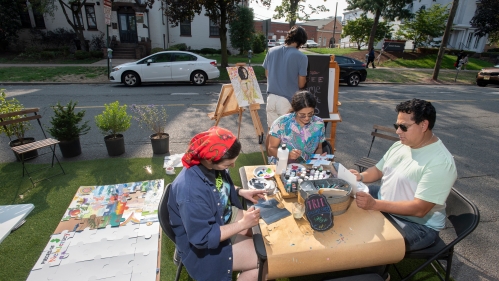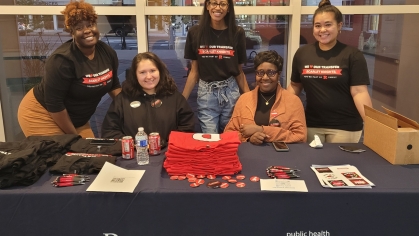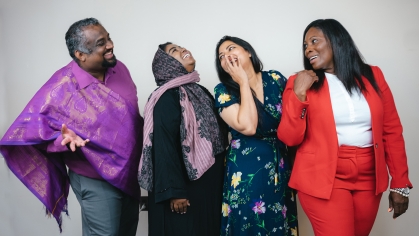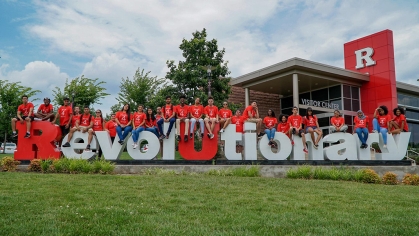Graduate Student Association Provides Programming and Advocates for Graduate Students at Rutgers—New Brunswick

When incoming graduate students begin their first semesters at Rutgers University—New Brunswick, many encounter the Graduate Student Association (GSA), which is featured in multiple opening events, including the Graduate Student Welcome.
The GSA, as an elected body of graduate student leaders, serves as the collective voice of all graduate students across the five campuses in New Brunswick and Piscataway and is advised by staff in the School of Graduate Studies (SGS). It also works collaboratively with Ghada Endick, the Assistant Dean of Graduate Student Life in the Division of Student Affairs.
“A key priority for the Office of Graduate Student Life is to work in partnership with the GSA and its leadership to connect students to the vast array of services and support at Rutgers, build community, and connections, and create a sense of belonging for our students across all Rutgers-NB graduate schools,” said Endick. “GSA leadership have been integral to ensuring that we center graduate students' voices in meeting their needs, and we have worked with campus partners to bring programming and services to the Graduate Student Lounge to create a vibrant affinity space for graduate students.”
In the words of its leaders, the GSA has two main areas of focus concerning graduate students: creating and supporting engaging programming and advocating on behalf of their interests.
“[The] GSA hosts a lot of events with the intent to create a community for graduate students, including a Halloween party, an end-of-year barbecue, and more,” said Nusrath Yusuf, who is a graduate student in the department of Cell Biology and Neuroscience. Yusuf, who serves as a senator for the GSA, also served as the Executive Vice President in the 2022-2023 academic year.
“We’re also an advocacy group: we listen to what graduate students need, and we push for those changes by working with groups and administrators across the university.”
For example, Yusuf said, last October, GSA partnered with departments and organizations in the Rutgers community to advocate around bodily autonomy, reproductive, LGBTQIA+ and caregiver graduate student issues. In the spring, the GSA issued a statement supporting the strike by graduate students and other academic workers at Rutgers.
As the representative body of graduate student leadership, the GSA also continues to financially support and facilitate over eighty Graduate Student Organizations (GSOs). These organizations are crucial to engaging graduate students through their interests, areas of study, and identities.
In fact, the current treasurer of the GSA, Tarun Arasu, became interested in participating in the GSA through his involvement in the Bloustein Graduate Student Association.
“We were doing a lot of activities for incoming international graduate students who didn’t really understand how Rutgers worked,” said Arasu, who is a graduate student in the Bloustein School of Planning and Public Policy. “We organized peer mentorship programs, as well as other events that helped these students adapt to a new culture at Rutgers and in the United States.”
“When the opportunity popped up to participate in the Graduate Student Association, I was attracted to the fact that it seemed much more like an umbrella organization for all graduate students on-campus.”
While the Graduate Student Association has existed since the 1960s at Rutgers, it has not always focused so clearly on both programming and advocacy.
“The GSA takes on a different tenor depending on the leaders,” said Dr. Barbara Bender, who serves as the administrative advisor to the GSA. “I’ve been advising the GSA for many years, and the foci of their activity varies depending on the current leadership of the organization.
“Right now, with these leaders,” Bender continued, “we’re seeing a really effective blend of recreational activities, focused disciplinary-based activities, and programs designed to enhance the quality of graduate student life.”
In the last few years, this approach has worked well in improving the lives of graduate students, according to Shawn Rumrill, a graduate student in Chemistry and Chemical Biology and a former President of the GSA.
“We’ve seen a marked change in the administration’s approach to graduate students over the past four years,” said Rumrill. “We’ve gone from invisibility to visibility, from a lack of understanding about the issues that we face to, at minimum, the same treatment and privileges that undergraduates are given on this campus.”
In the spring semester, the GSA intends to continue hosting events, including End of the Year BBQ, Yoga in the Graduate Student Lounge, and Game and Movie nights. In terms of advocacy, the GSA aims to find ways to support graduate students who are also in caregiving roles and to carve out more dedicated space for graduate students across the New Brunswick and Piscataway campuses.
Looking forward, though, many of group’s leaders—including its current president, Eric Chiles, who is a graduate student at the School of Environmental and Biological Sciences—have a broader vision for what the GSA can be for graduate students at Rutgers—New Brunswick.
“We want to create a real place for community at the GSA,” Chiles said. “We want graduate students to know that we’re here as full, equitable members of this beloved community, and we want to be heard by the university as well.”
To learn more about the GSA, click here to visit their website. You can learn more about their events here, and graduate students can join their discord here.



